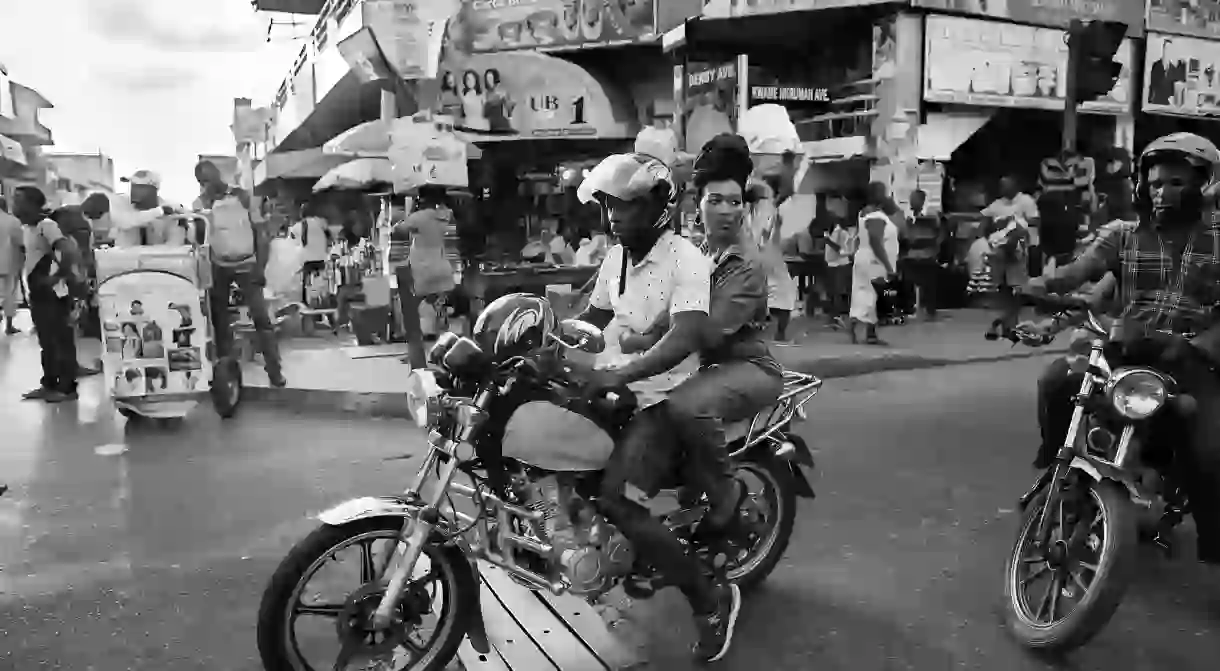Meet Lhola Amira, the Artist Who's Rediscovering Post-Colonial Africa

Lhola Amira’s first solo exhibition, Looking for Ghana & the Red Suitcase, opened last month and is not to be missed. We chat to her about the inspiration behind the project and more.
Looking for Ghana & the Red Suitcase presents a selection of photographs, an installation and video piece that are all rooted in Amira’s recent project, based in Ghana.
Where did you grow up and where do you currently live?
I grew up in Gugulethu and still live in the Cape.
What position does South Africa specifically play in your drive to ‘look’ for Ghana?
South Africa is strange in so many ways. Post-1994 took us through various phases of trying to understand what democracy actually means for black people. We went through peace in our land, The Truth and Reconciliation Commission, Simunye (We Are One), The Rainbow Nation, Mandela magic and then collective amnesia.

Black people continue to suffer the repercussions of oppression in the post-apartheid era, democratic South Africa. So what does ‘to be free’ really mean, what does it look like? It’s important to remember that after colonialism, South Africa went through apartheid. Now, the decolonising conversation has resurfaced because there’s a radical black-self-love happening with the youth throughout Africa. This is what drives me, that black children and young adults are realising and articulating what Nina Simone first sang on June 24, 1958; To Be Young, Gifted and Black.
I am in no way romanticising Africa. There is nothing romantic about the violence we have experienced, and continue to experience and survive. There’s nothing romantic about the poverty porn the world portrays about Africa. It’s this lack of romanticism and radical black self-love that drives me.
Tell us a bit about the inspiration behind Looking For Ghana & the Red Suitcase
Ghana was the first African state to receive independence, 60 years ago. These 60 years mark a generation; in socio-political and socio-economic terms there should be a significant shift from the former colony. The Red Suitcase is a metaphor for De/Colonial Love.

What are your thoughts around the necessity of someone already living in Africa to rediscover it?
Africa as we know it now is still seen and experienced through a colonial lens. There are colonial monuments everywhere, and by this I mean infrastructure, churches, street names, town planning, etc. To rediscover Africa would mean to deconstruct the colonial experience as the only narrative from which we trace ourselves, but at the same time being aware that there is no other Africa to return to. This is what Africa is.
Essentially, to rediscover it means to deconstruct it by admitting that this contemporary moment is what decolonised Africa actually is.

What does a future decolonised Africa look like to you?
The current time is what decolonised Africa looks like. This is its future; Ghana 60 years after independence and South Africa 25 years after. Perhaps the question should be ‘how do we imagine Africa’ instead of ‘how do we re-imagine it’. I am attempting to imagine Africa, and realising that imagination is far more challenging than re-imagination. This is because re-imagination works within the structures that already exist and imagination works beyond them. If I can imagine Africa – I can create her.

What has been the highlight of your career as an artist?
My first solo exhibition is definitely a highlight and working with Wanlov the Kubolor, Francis Kokoroko and ELi, three amazing Ghanaian artists, for my short film and photography.
African art is booming at the moment. What about the scene currently excites you?
When was African art not booming? The difference now is that African artists get the recognition they deserve and get to make some money.

What lies ahead for you?
I am thinking of Home, Kenya and Uganda.
Looking for Ghana & the Red Suitcase is on until April 1, 2017 at SMAC Gallery, Stellenbosch.













